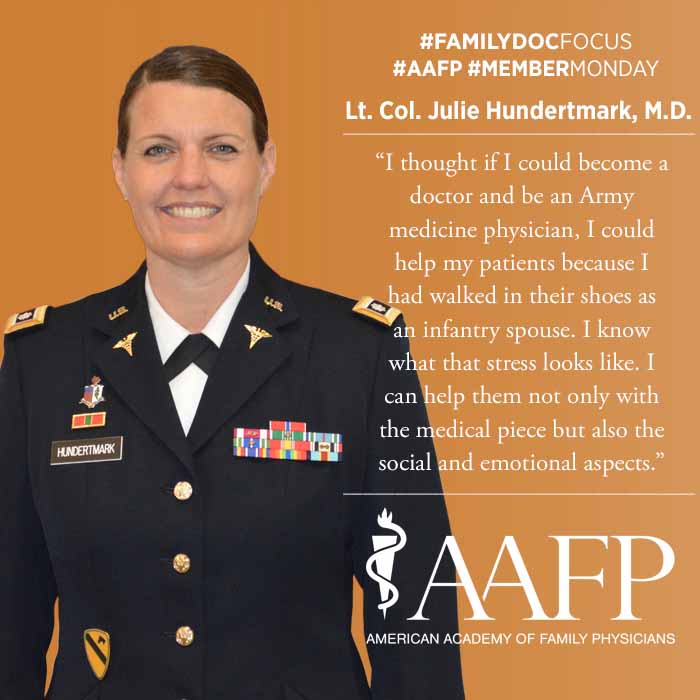From Army Wife to Army Doctor
August 27, 2018 10:14 am David Mitchell – Lt. Col. Julie Hundertmark, M.D., dreamed of being a physician, but the Army wife's road to medical school had its share of detours.
Hundertmark married her next-door-neighbor-turned-soldier soon after high school, and her husband, Kevin, was stationed at Army bases in California, Georgia, Kansas and Germany, and was deployed to Iraq and Bosnia.
"Every place we moved I took classes, trying to work toward my goal of a career in medicine," said Hundertmark, a physician recruiting integration officer for the U.S. Army Medical Recruiting Brigade. "It's difficult for an infantry spouse."
College is difficult for young parents, too, and Hundertmark has four children. As the family grew, it was Army family physicians, obstetricians and pediatricians who provided care.
"My parents told me I could be anything I wanted to be," said Hundertmark, who grew up in a middle-class family in a small, rural Kansas town. "I felt empowered to do that, but I didn't know how to navigate it. I thought becoming a doctor would be unattainable with a family of six."
That changed when a physician told her about the Army's Health Professions Scholarship Program (HPSP), which pays 100 percent of students' tuition for four years at any U.S. med school in exchange for four years of active duty service. The program also covers books and provides a monthly stipend, signing bonus and allowance for food and housing.
Hundertmark's husband eventually left active duty so she could focus on her education as a 27-year-old junior.
"I was excited," said Hundertmark, who is two years into her third Army contract. "I thought if I could become a doctor and be an Army medicine physician, I could help my patients because I had walked in their shoes as an infantry spouse. I know what that stress looks like. I can help them not only with the medical piece but also the social and emotional aspects."
After residency, Hundertmark was deployed to Iraq for a year. She returned to the States in 2010 as the officer in charge of a family medicine clinic at Fort Benning, Ga., that had roughly 21,000 patients. She received the Surgeon General's Physician Recognition Award for leading the first Army clinic to adopt the patient-centered medical home (PCMH) model. She also served as residency faculty.
Her success in transforming her clinic led her to the role of PCMH champion for the Southern Region Medical Command, helping to transform 53 other Army primary care clinics to the medical home model.
In 2014, she became deputy commander for clinical services at the Defense Language Institute, Presidio of Monterey, Calif. For three years, Hundertmark had oversight of the family medicine clinic, as well as pediatrics, behavioral health and physical therapy.
Hundertmark, who was recently a featured speaker at the National Conference of Family Medicine Residents and Medical Students, still sees patients, but these days she spends much of her time on the road as a recruiter. Her children are grown, including a son who is an HPSP recipient in his second year of medical school.
"I sought out this post when I heard about it," Hundertmark said. "I love what I've done in the Army, and I'm encouraging other physicians to follow me. I can speak to so many aspects of this as a mom, wife and a physician."
